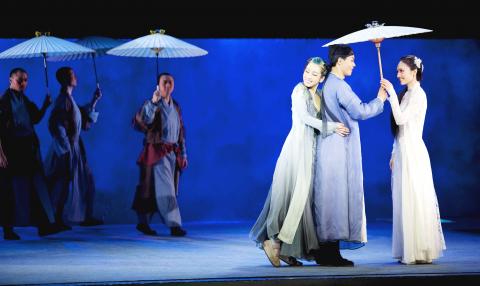Green Snake (青蛇) , the smash theater hit produced by China National Theater (中國國家話劇院), is a wild departure from its original source.
Legend of the White Snake (白蛇傳) narrates the romance between the demon White Snake and the handsome human scholar Xu Xian (許仙), as well as the quest of monk Fahai (法海) to break up the forbidden love. It’s a chaste romance, and Green Snake is strictly not.
“This is a story about seduction,” Tian Qinxin (田沁鑫), the play’s director, told the Taipei Times in a phone interview.

Photo courtesy of Taipei Arts International Association
Adapted from the acclaimed novel by Hong Kong novelist Lilian Lee (李碧華), Tian’s play turns the spotlight to Madame White Snake’s faithful companion, Green Snake, who also craves human love — and sex.
Jealous of the relationship between White Snake and Xu Xian, Green Snake is willing to forsake her immortality to steal him, leading to a disastrous romantic triangle. White Snake seduces Xu Xian to save her marriage, while Fahai seduces Xu Xian in an attempt to break up the taboo marriage. The play unfolds like a psychological drama, filled with anger, lust and temptation.
Chinese thespian Qin Hailu (秦海璐), who has won three Golden Horse Awards, takes the leading role of Green Snake in a sultry performance that was well-received in China and Hong Kong.
The cast also includes actress Jin Ge (金戈) as Lady White Snake, Dong Chang (董暢) as the handsome male scholar Xu Xian and Xin Baiqing (辛柏青) as the monk Fahai. There are three shows from Aug. 9 to Aug. 11 at the National Theater Taipei. Performances are in Mandarin, with Chinese and English subtitles.

Taiwan has next to no political engagement in Myanmar, either with the ruling military junta nor the dozens of armed groups who’ve in the last five years taken over around two-thirds of the nation’s territory in a sprawling, patchwork civil war. But early last month, the leader of one relatively minor Burmese revolutionary faction, General Nerdah Bomya, who is also an alleged war criminal, made a low key visit to Taipei, where he met with a member of President William Lai’s (賴清德) staff, a retired Taiwanese military official and several academics. “I feel like Taiwan is a good example of

March 2 to March 8 Gunfire rang out along the shore of the frontline island of Lieyu (烈嶼) on a foggy afternoon on March 7, 1987. By the time it was over, about 20 unarmed Vietnamese refugees — men, women, elderly and children — were dead. They were hastily buried, followed by decades of silence. Months later, opposition politicians and journalists tried to uncover what had happened, but conflicting accounts only deepened the confusion. One version suggested that government troops had mistakenly killed their own operatives attempting to return home from Vietnam. The military maintained that the

Before the last section of the round-the-island railway was electrified, one old blue train still chugged back and forth between Pingtung County’s Fangliao (枋寮) and Taitung (台東) stations once a day. It was so slow, was so hot (it had no air conditioning) and covered such a short distance, that the low fare still failed to attract many riders. This relic of the past was finally retired when the South Link Line was fully electrified on Dec. 23, 2020. A wave of nostalgia surrounded the termination of the Ordinary Train service, as these train carriages had been in use for decades

Lori Sepich smoked for years and sometimes skipped taking her blood pressure medicine. But she never thought she’d have a heart attack. The possibility “just wasn’t registering with me,” said the 64-year-old from Memphis, Tennessee, who suffered two of them 13 years apart. She’s far from alone. More than 60 million women in the US live with cardiovascular disease, which includes heart disease as well as stroke, heart failure and atrial fibrillation. And despite the myth that heart attacks mostly strike men, women are vulnerable too. Overall in the US, 1 in 5 women dies of cardiovascular disease each year, 37,000 of them